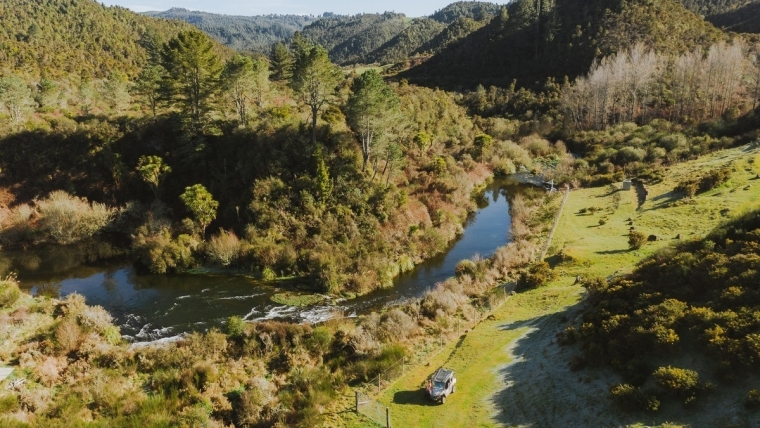
By Eric Frykberg
The state-owned farming company Pamu has posted a huge jump in profit, boosted by higher prices and greater output.
The result puts the doldrums of two years ago well behind it.
Pamu’s Net Operating Profit (NOP) rose to $49 million for the year to June, which was a 145% rise.
The Net Profit after Tax (NPAT) was even more dramatic. That rose to $120 million, which was a massive 561% rise. But the largest part of that increase came from writing up the valuation of livestock based on booming international prices.
Pamu is the trading name for the SOE, Landcorp Farming Ltd, which has 112 farms, totaling 356,048 hectares. It exists to return a dividend to the Crown, though much of its land is committed to iwi under the Right of First Refusal (RFR), which is an extension of the Treaty Settlement process.
The latest result pulls the company well and truly out of the mire. A year ago, Pamu reported an NPAT loss of $26 million, and that followed a negative NPAT of $9 million the previous year.
Valuation write downs due to low prices for its output were largely to blame then.
The latest positive result has Pāmu’s Chief Executive Mark Leslie thrilled about a “back-to-basics focus on core farming.
“Our record result is a strong signal that the performance reset is delivering tangible value for New Zealand, enabling us to declare a $15 million dividend.”
The company also declared a 7.3% Return on Equity, up from -1.4% in FY24. Livestock revenue rose by $36 million and milk revenue rose by $32 million.
Pamu adds the outlook for the current year is also good. NOP for FY26 is forecast higher, ranging between $69 million and $79 million. There is no NPAT forecast due to variability in livestock valuations.
“As a State-Owned Enterprise, we’re proud to build on our legacy with a sharper focus on commercial strength, social responsibility and environmental stewardship,” Leslie says.
Despite Pamu’s strong financial numbers, an agricultural expert at the New Zealand Institute of Economic Research issues a qualification, due to Pamu’s unique status as a state farming enterprise.
“Livestock is revalued annually at the end of each financial year, reflecting market prices, which are outside the company's control and are therefore not a good indication of performance,” says Chris Nixon.
“Pāmu farms are revalued when the market has materially changed, and the impact can be large and have a significant positive or negative effect on after-tax results. But you know, the point about this is, we don’t really know.
“Things can be going gangbusters, but the issue is, have they done the best they possibly could? I can’t answer that question, and presumably no one really could, could they?”
Nixon is not criticising the company, just pointing out that traditional market analysis is hard to do with an SOE. And analysis is difficult even in the private farming sector, with many variables between one property the next.
The national vice president of Federated Farmers Colin Hurst is pleased with the results.
"Pamu is responsible for $2.2 billion of taxpayer assets and New Zealand farmers expect its operations to be viable and to turn a profit like any other farm," he says.
"A 7.3% return on equity, up from -1.4% is very respectable and it is welcome that the Pamu will return a $15 million dividend to the Government."
Hurst adds Pamu's result stems in part from benign trading conditions. He says all farmers acknowledge that fact but also welcome steps taken to streamline regulation and to remove unnecessary costs."
The Pamu result contains several non-financial benchmarks. For example, 65.5% of its calves are reared for dairy or livestock production, up from 56% in FY24. The company is aiming for 100% by 2030. This is part of a nationwide trend against the euthanasia of bobby calves, for economic and reputational reasons. Pamu is also claiming higher than average lambing and calving rates on its farms.
4 Comments
“ Livestock is revalued annually at the end of each financial year, reflecting market prices, which are outside the company's control and are therefore not a good indication of performance,” says Chris Nixon.
“Pāmu farms are revalued when the market has materially changed, and the impact can be large and have a significant positive or negative effect on after-tax results. But you know, the point about this is, we don’t really know.”
Can anyone shed any light on how much of this result is based on revaluations ?
Thanks for this inquiry, Whitney. Here is the full line from the Pamu annual report, which had been shortened for reasons of space in my final story.
- Net Profit after Tax of $120 million for the year ended 30 June 2025, up 561.5% which includes fair value gain on animals and forestry (biological assets) of $96 million in FY25.
The initial answer then to your question is, 'quite a lot!'.
More detailed information will be available when Pamu's full financials are tabled in Parliament in mid September, as Pamu makes clear here: https://www.pamunewzealand.com/about/financials
regards Eric Frykberg
Thanks Eric
So really only a $24 million cash profit !
Smoke and mirrors comes to mind
Be interesting to see the split between animals and forests. Pamu have planted a lot of forest in last 10 years so this will start to add up over time as it grows and compounds away in value.

We welcome your comments below. If you are not already registered, please register to comment
Remember we welcome robust, respectful and insightful debate. We don't welcome abusive or defamatory comments and will de-register those repeatedly making such comments. Our current comment policy is here.